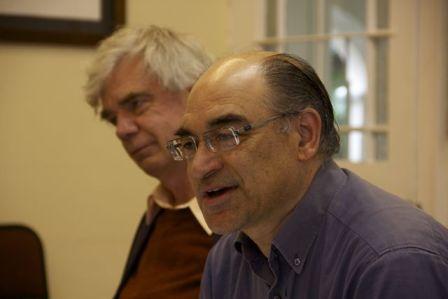
Tracking the history of struggle movements in South Africa and abroad was the focus of Lineages of Freedom, an interdisciplinary colloquium that opened a critical dialogue around the social and political tensions that exist in South Africa eighteen years into democracy. It brought together community activists and academics from sociology, politics, biology, economics, history and journalism.
Such a discussion could not be more timely than in the wake and disillusionment following the tragedy at Marikana. In his opening address, Rhodes Dean of Humanities, Prof Fred Hendricks, established the intention of the event: “Our task, as intellectuals and people keen to understand, is to try to chart the dimensions of this crisis and position what should be done to design a resolution.”
Internationally renowned scholar and activist, Prof John Holloway, set the tone of the colloquium. Evoking Bob Marley’s eminent freedom hymn, “Redemption Song”, he emphasised the persistent nature of South Africa’s struggle, despite the abolition of state-sanctioned inequality.
“There’s a sense that this is not what you fought for -- though there have been great changes, fundamental changes,” said Prof Holloway, insisting that South Africa now lives with an apartheid dictated by money and class. To address present issues and begin to redeem the struggles of the past, he called for an approach of critical realism and especially, for a more urgent and radical commitment from higher education. “We sing redemption songs by walking in the wrong direction, whenever and however we can,” he said.
The first session of the day saw Dr Jacques Depelchin on the topic: “Silences in African Histories of Liberation.” Dr Depelchin, who has written extensively on the Congo and more generally on the history of liberation movements in Africa, is currently visiting Rhodes as a Hugh le May Fellow.
He discussed inherited systems that have curtailed freedom and progress in Africa and the developing world. “My sense is we really do not understand what we’re up against. By that I mean capitalism in all its manifestations,” he said.
For the purpose of disentangling ourselves from corrosive lineages and fully realising freedom, Dr Depelchin advocated for an honest interrogation of history. As an example, he cited the Enlightenment in Europe as a period of repression and terror in Africa.
“Should one consider the Enlightenment a part of our lineage?” he asked. Other possible blights could be the problematic development of Anthropology as a social science, and its historical use as a tool to justify racism and conquest.
Dr Depelchin mentioned the ancient Egyptian concept of ‘maat’, which seeks to integrate truth, balance, law, morality and justice, as a possible avenue for healing and regeneration. Returning to the central question, he asked how we can recover the massive mistakes of independence, and proposed we start by facing the silences in our own conscience.
Photo and story by Hailey Gaunt
